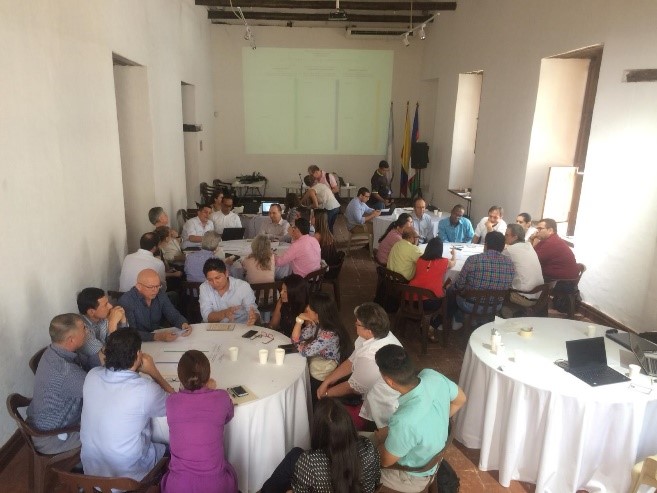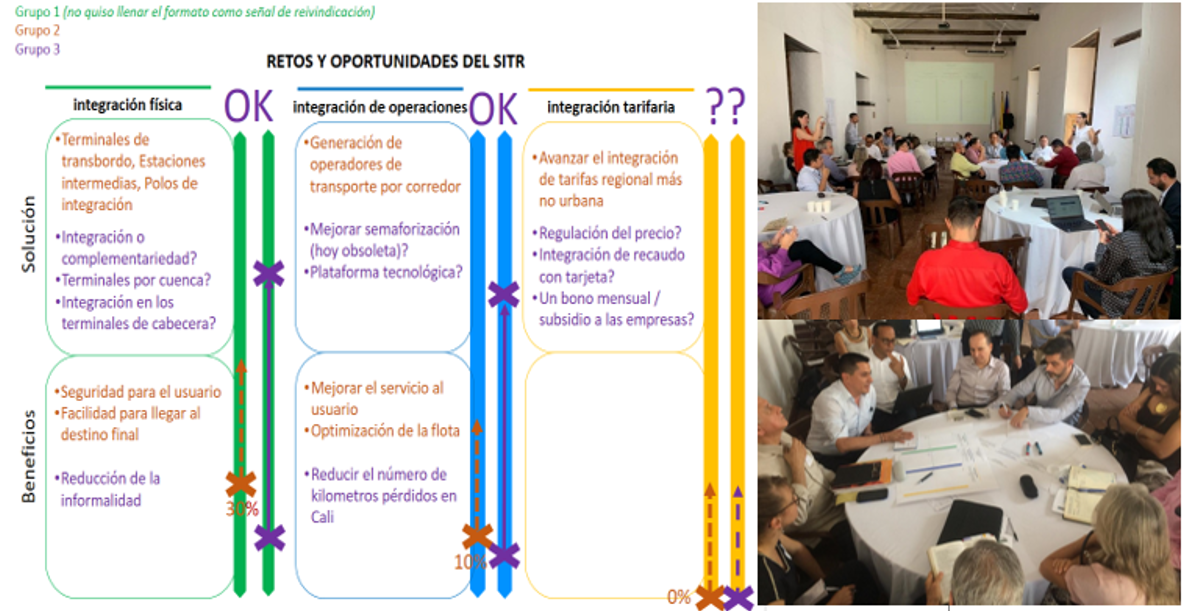[Cooperation Colombia] Third workshop on regional transport integration
In February, CODATU launched a technical cooperation in Cali, Colombia, on metropolitan governance of public transport. In partnership with the French Development Agency AFD (through FEXTE funding), the cooperation aims to support local authorities in the implementation of a « Regional Transport Authority » (RTA) in the metropolitan area of Cali. The cooperation is part of a broader context of strategic mobility projects for the region currently in development supported by the French Embassy in Colombia and the AFD through FASEP and FFEM funding : the local train linking Cali and the neighboring municipalities (the project is currently in prefeasability stage, conducted by SYSTRA) and the « Corredor Verde » project which promotes soft mobilities and urban renovation alongside the railway in Cali.
Context
Codatu first workshop took place in May 2019. Its main objective was to understand collectively the potential rol and functioning of a Regional Transport Authority, identify current challenges and imagine scenarios of regional institutional organisation. In July, a second workshop was organized by DVDH-GSD+, the consulting group in charge of structuring the future RTA. This first step of the cooperation involved local, regional and national entities, who showed their willing to build a new organization to respond to regional challenges and implement a Regional Integrated System of Transportation.
 The second stage of the cooperation looks to open the process of co-construction to all the stakeholders involved in regional transport (private operators and users) as fundamental pillars of the transportation system. For this reason, the objective of the 3rd workshop was to define collectively “The role of the RTA in the construction of the future Regional Integrated System of Transportation of Cali”.
The second stage of the cooperation looks to open the process of co-construction to all the stakeholders involved in regional transport (private operators and users) as fundamental pillars of the transportation system. For this reason, the objective of the 3rd workshop was to define collectively “The role of the RTA in the construction of the future Regional Integrated System of Transportation of Cali”.
Session 1: The rol of the RTA in the construction of the Regional Integrated System of Transportation
 The first session set general conclusions about the process of constructing integrated multimodal systems of transportation and the fundamental role of transport authorities in ensuring coherent and complementary systems in a holistic network vision. We showed how levels of institutional, operation, physical and fare integration vary largely accross cities to respond to local conditions and population needs.
The first session set general conclusions about the process of constructing integrated multimodal systems of transportation and the fundamental role of transport authorities in ensuring coherent and complementary systems in a holistic network vision. We showed how levels of institutional, operation, physical and fare integration vary largely accross cities to respond to local conditions and population needs.
Session 2: National experiences of transport reorganisation
The testimony of a national Authority and its private public and allies (Medellin SITVA) allowed to show participants the steps, results and lessons learned of the construction of an integrated metropolitan system. From the points of view of both the public entity Metro de Medellín and a private operator of the system, we showed how through a slow and sometimes difficult path of adaptation of the network, the different public and private stakeholders were able to build a win-win relationship and look to improve the public system of transportation as a whole. The testimony of local experience Corredor del Pacífico in Valle del Cauca allowed to show the willing of private enterprise to associate in order to generate a positive impact on enterprises, bus owners and users, despite the many obstacles to implement a joint operation in a specific line.
Recognizing the several efforts already undertaken towards a higher level of complementarity of the regional system, participants worked collectively to identify opportunities and challenges of building a Regional System of Transportation in Cali.

Session 3: Result of the institutional structuration study
DVDH and GSD+ presented the details of the institutional structuration they recommend, that will allow the RTA to be functional and effectively fulfill its missions.
Results and main discussions
The workshop allowed to underline the tremedous level of distrust between public and private stakeholders, especially private bus companies, and the absolute necessity of generating mechanisms to build trust to be able to implement positive changes in the transportation system. Also, some participants questioned the actual relevance of structuring a RTA in Cali, given the fact that legal mechanisms already exist to promote a higher level of complementarity and integration of the system.
The collective exercise showed that there is currently a certain level of complementarity in the region between the BRT system MIO in Cali and traditional bus lines at physical and operational levels. It also showed that several stakeholders are willing to work towards a greater level of integration, implementing multimodal transfer stations in the entrances of the city and promoting the union of private companies in order to avoid disloyal competence. The potential benefits of generating fare integration did not appear as obvious for many participants, especially private operators. All the solutions evaluated by the participants will in all cases require to restaure the trust between stakeholders, gain the aprobal of opposants, technical studies, and anticipation of environmental, social and financial costs of the solutions.
Next step
In december will take place the last workshop of the cooperation aimed at presenting the process and the results of the institutional structuration to the newly elected municipal and regional representatives in order to give continuity to the process. It will also aim to start building trust with non-institutional stakeholders.
Download the full report (in spanish) : Informe-Taller#3-VF
To learn more about …
- First workshop (may 2019)
- Second workshop (july 2019)
